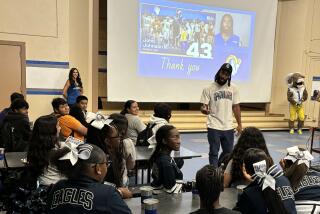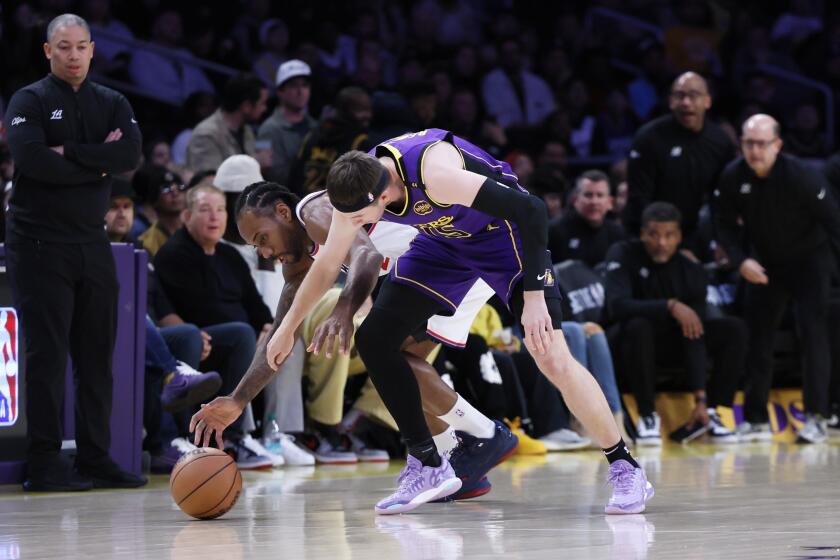Magic Johnson remains a living symbol of hope
- Share via
Magic Johnson has finished giving a speech in a high school gymnasium when he asks the students if they have any questions.
A girl shyly raises her hand and moves to the microphone.
“I don’t really have a question,” she says. “I just want to know if I can come up there and give you a hug.”
Within moments, the entire student body descends upon Johnson, grabbing his massive hands, clinging to his broad shoulders, embracing him from to shoes to smile, covering his massive body with admiration and love.
“And to think, 20 years ago, some people were afraid to touch me,” Johnson says.
::
Where were you? It was 3 p.m. on the afternoon of Nov. 7, 1991, and if you lived in Los Angeles, you know where you were.
It was our Kennedy assassination moment, our Challenger space shuttle moment, a moment when the Southland lost its sports innocence.
Where were you? I was home on vacation after spending the summer covering the Dodgers for this newspaper. I was watching television while my two young children played in the background. Soon they were crying because their father was crying, and at the time I didn’t even know Magic Johnson.
The greatest Laker ever announced he was retiring at age 32 because he had contracted one of the most awful diseases imaginable.
“Because of the HIV virus that I have obtained, I will have to retire from the Lakers today,” Johnson said in a packed room at the Forum.
We shuddered. We froze. Then we called everyone we knew, and into the phone together, all of us at once, we screamed.
Did the most alive athlete in the history of Los Angeles really just announce he was dying?
At the time, it was assumed that everyone who had the HIV virus would eventually contract AIDS, which meant Magic Johnson would be gone in 10 years. Those were the statistics. That was the reality.
There was only one smile at the news conference, only one mention of hope. It came from Johnson himself, and we pitied him for it.
“I plan to go on living for a long time,” he said, and you probably did not believe him.
We did not know. How did he know?
Monday is not the 20th anniversary of a death, but perhaps the most stirring rebirth in the history of American sports.
Twenty years after contracting a disease that was supposed to kill him, Magic Johnson is killing the disease by using his celebrity to raise millions for AIDS research.
Twenty years after disappearing from a basketball court where he had won five NBA championships, Magic Johnson has made an even bigger impact on the rest of the world, using his smarts to invest millions into the inner city through his businesses.
Twenty years later, there are many people in this country who consider Magic Johnson to be one of our greatest sports figures even though they never saw him play and know little about sports. Who else has such stature? Jackie Robinson? Muhammad Ali? Who else?
“I have to tell you, I’m proudest of my life off the court,” Johnson says. “There will always be great basketball players who bounce that little round ball, but my proudest moments are affecting people’s lives, effecting change, being a role model in the community.”
Twenty years after the announcement, I am reminiscing with Johnson about his wondrous journey from darkness into light, and suddenly he wants to make another announcement.
“We’re on the verge of opening a seventh AHF Magic Health Clinic,” he says, referring to his AIDS Healthcare Foundation-sponsored storefronts. “All these people all over the country can come in and get their HIV meds for free. Can you imagine?”
Honestly? No, I never imagined any of this. Did anybody but him?
::
Perhaps the most amazing thing about the Magic Johnson HIV announcement wasn’t the term “HIV,” but the word “announcement.”
He didn’t have to announce it. He didn’t have to tell anybody, ever. He could have retired under the guise of a neck injury that put him in danger of paralysis. He could have said he was retiring because of family issues.
Only his doctors knew of his HIV, and they were silenced by patient confidentiality laws. If it never became AIDS, who would ever know?
The man who made what still might be the most unsettling admission in sports history never had to say anything.
“No, I didn’t, and I thought of that,” Johnson says. “I thought a lot about that.”
He says he thought of the prejudices against people with HIV. He thought of the slams and the slurs and the rumors about his personal life. He said that after the diagnosis he drove around town having living nightmares.
“There was going to be a backlash, and it was going to be bad, and I knew it,” he says.
But he also knew of Elizabeth Glaser, the HIV-positive wife of actor Paul Michael Glaser. Despite being in the public eye, Glaser became a leading AIDS activist before her death in 1994. Johnson saw her bravely fighting against the disease from her Hollywood pulpit, so he called her several times for advice.
“She told me that what this disease needs is a face, and that I could be that face,” he recalls. “She told me I could save people’s lives. I thought about it, and she was right.”
So, despite living in an environment in which most athletes hide even the tiniest of rashes, Johnson decided to publicly admit that he was suffering from the most denounced of illnesses, an illness he contracted by having sex with multiple partners, an illness that could have been avoided.
Magic had the courage to announce he was not magic, which was probably the most magical thing of all.
“I knew I was going to suffer,” he says. “But if this could help someone else who was suffering, then I would do it.”
We cried for a week. Johnson says he cried twice.
He cried when he told his wife, Cookie, about the disease, tears of shame for his actions, tears of fear for the health of Cookie and their unborn son, tears of unfound dread that she would leave him.
He cried later after he told his teammates, tears that he would never again share the joy of playing the game he loved with men who had become like family.
After that devastating farewell in the bowels of the Forum locker room, he never cried again.
“I was too busy to cry,” he says. “I had a life to lead.”
::
Twenty years ago, when the furor died, that life wasn’t so easy.
“Some people dissed me, didn’t like me, judged me. They felt like I wasn’t the same Magic, that I was this bad guy,” he recalls.
He kept playing basketball, turning an honorary appearance into an MVP award at the 1992 NBA All-Star game. Then he played on the U.S. Dream Team in that summer’s Olympics, and slowly became empowered to try a comeback. That comeback was aborted, however, when several players, most notably Karl Malone and Mark Price, said they did want to play with him for fear of catching HIV from his infected blood.
“I didn’t understand how I was good enough to play with these guys at the Olympics, but suddenly wasn’t good enough to play with them during an NBA season,” recalls Johnson. “It really hurt.”
After a brief stint as Lakers coach, Johnson returned to the court one last time in the final 32 games of the 1995-96 season before retiring again.
So many years later, he has but one regret about his playing career, but it’s a big one.
“If I had to do it all over again, I wouldn’t have retired in the first place,” he says. “There were so many unknowns about the disease, about my immune system, I didn’t have a choice at the time. If only I knew what I know today.”
::
Three pills, twice a day.
You want to know how Magic Johnson knows today? It’s exercise and faith and three pills twice a day.
I beg him to give me the name of the three pills. He says everyone asks, but his doctors have sworn him to silence for the sake of those who might try to use those three pills to self-medicate.
“It’s three pills that anyone can get; they are affordable and available for everyone. But just because it’s my mix doesn’t mean it’s your mix,” Johnson says.
Three pills now, down from as many as 15 pills in the beginning, and Johnson says not once has his body betrayed him. His T-cell count remains good. He is not getting any sicker. The demon remains silent.
“I’m not cured, but the HIV is asleep deep in my body,” he says. “Every day, I just do what I’m supposed to do. The best doctors and medicine in the world can’t save you if you don’t do what you’re supposed to do.”
Recent advancements in treatment have reduced the AIDS death rate by 80%, and newly diagnosed AIDS patients now have a life expectancy of 20 years. But have we all agreed now that Magic just might live forever?
Twenty years later, thinking back to when nobody wanted to touch him, Johnson remembers who did.
He says he will never forget how, instead of leaving him, Cookie prayed with him and vowed to help him fight through it. They remain a strong couple today. He says he will never forget the hugs given to him by everyone from Jerry Buss to Jerry West to Pat Riley.
“I want to tell everyone, it’s not just you, you need a great support system to survive things like this.”
Twenty years later, the death sentence has become life affirming, even amid the echoes of the crude sentence by which some in the world still define him.
I thought you would be dead.
This is one of the most awful things one person can say to another, a statement completely lacking in faith and wholly devoid of hope. Yet, Johnson has a magic response to the dozens of people in the last 20 years who have had the nerve to say exactly that to his face.
“I’ll hug them,” Johnson says. “And I’ll tell them, ‘Man, I’m just glad I’m here.’ ”
twitter.com/billplaschke
More to Read
Go beyond the scoreboard
Get the latest on L.A.'s teams in the daily Sports Report newsletter.
You may occasionally receive promotional content from the Los Angeles Times.











